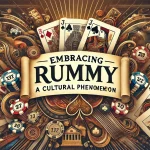
The Complete Guide to Rummy The card game rummy, which has intrigued players for centuries, has a long and diverse history that dates back to the early 1800s. Rummy’s precise beginnings are still a little unclear, but it’s generally accepted that it developed from earlier card games like “Concentration” & “Pinochle.”. During the 1900s, the game became very popular in the US, especially after Elwood T. Gin Rummy was introduced in 1910. The Baker.
Because of its quick gameplay and straightforward rules, this variation of rummy quickly gained popularity among players. Rummy evolved into many variations that represent regional tastes and customs as it spread throughout the world, adapting to various cultures & geographical areas. Rummy’s historical trajectory extends beyond its gameplay and encompasses the social and cultural facets of the societies in which it was popular.
Rummy has been more than just a recreational activity in many cultures; it has been used to foster friendships and family ties. For example, the game has become a mainstay of social events & festivals in India, where it is frequently played for stakes ranging from modest to substantial. The game’s enduring appeal and status as a popular pastime across generations can be attributed in part to its capacity to unite people.
With its historical origins, rummy serves as a reminder of the diverse range of interpersonal relationships that card games can promote. There are many different variations of rummy to suit a variety of tastes & preferences, so it’s not a single game. Indian Rummy is one of the most well-liked variations, distinguished by its distinct rules and gameplay elements.
Indian rummy, which is usually played with two decks of cards and jokers, requires players to draw and discard cards in order to create valid sets and sequences. Because players must carefully manage their hands while anticipating their opponents’ moves, the game frequently places a greater emphasis on skill and strategy than other versions. Played both recreationally and competitively, this variation has become extremely popular in India. Gin Rummy is another popular variation that has a unique charm of its own. Usually played by two players using a standard deck of cards, Gin Rummy places a strong emphasis on strategic decision-making and fast thinking.
Players try to minimize the value of unmelded cards in their hands while forming melds, which are combinations of three or more cards of the same rank or in sequence. Because players must balance their offensive and defensive strategies in order to outsmart their opponents, the game’s appeal is rooted in its combination of skill and luck. The variety of rummy variants demonstrates not only how versatile the game is, but also how various cultures have adopted it and made it distinctively their own. Players are expected to adhere to a specific set of etiquette when playing rummy, just like in any other social game.
Comprehending these traditions can improve the experience for all parties. Behaving respectfully at the table is one of the basic rules. When others are taking their turns, this involves avoiding talking too much or being distracted. In order to preserve the competitive spirit of the game, players should also refrain from showing their cards or talking about their strategies while playing. It’s also critical to keep an eye on the clock; if you take too long to make decisions, other players may become irritated and the game may not flow as intended.
The ability to resolve conflicts amicably is another crucial component of rummy etiquette. There could be disputes about the rules or how to play any card game. Players must resolve these conflicts amicably and politely, aiming for agreement rather than raising hostilities.
Following the rules becomes even more important when participating in a tournament or more formal setting. Knowing the rules that apply to their particular variation of rummy is important for players because it shows respect for the game and builds one’s reputation as a player. Participants can create a fun environment that promotes friendship & healthy competition by adopting these traditions. Players from all walks of life who want to test their skills against others in a competitive setting are drawn to rummy tournaments, which have become an exciting feature of the game. Local get-togethers at community centers or major competitions held by internet sites or casinos are examples of these kinds of events.
A champion is crowned after winners advance through brackets in tournaments, which frequently have structured formats that let players compete in multiple rounds. The thrill of playing rummy in a tournament comes from the challenge as well as the friendship that forms between players who are passionate about the game. More than just luck is needed to win at rummy tournaments; strategic thinking & flexibility are also necessary. Gamers need to have a thorough awareness of both their own and their rivals’ strengths and shortcomings because they will be up against players with different styles and skill levels.
To further encourage players to improve their abilities and create winning strategies, a lot of tournaments also provide cash prizes or other incentives. These tournaments are evidence of rummy’s enduring appeal and its capacity to unite people who have a passion for this classic card game, as the game continues to gain popularity as a competitive sport. A combination of skill, strategy, & psychological awareness of opponents’ actions are essential for success in rummy.
One basic tactic is to keep a careful eye on the cards that other players draw & discard. You can learn a lot about your opponents’ possible hands by keeping an eye on the cards they are collecting or avoiding, and you can modify your own strategy accordingly. If an opponent is routinely discarding high-value cards, for example, it can mean they are attempting to minimize the value of their hand before going out or are aiming for lower-point melds. Effectively controlling your own hand is another essential component of rummy strategy.
To prevent giving your opponents an advantage, you must know when to discard particular cards and when to hold onto them for possible melds. Players should also monitor their opponents’ progress & be aware of how crucial it is to form sets and sequences early in the game. The secret is striking a balance between defense & attack; you want to build your hand as effectively as possible, but you also need to keep your opponents from finishing theirs. Players can greatly increase their chances of winning the game by using these tactics and staying flexible throughout. Rummy has influenced popular culture in ways that go beyond card tables, as evidenced by its appearances in television series, films, and music.
In movies, rummy frequently provides the setting for key scenes that emphasize themes of character camaraderie, strategy, or deceit. As an illustration of how rummy games go beyond simple entertainment to become a metaphor for life’s complexities, classic Bollywood films regularly use them as a way for characters to bond or settle disputes. Rummy has been incorporated into music in addition to movies, with songs utilizing the game as a representation of fate and chance. Rummy’s captivating lyrics may conjure up images of card games, such as taking chances, being uncertain, & the excitement of competition. These cultural allusions serve to both acknowledge and celebrate the game’s widespread appeal and solidify its position as a universal experience that appeals to viewers from a variety of backgrounds.
Rummy’s continued influence on artists and storytellers is evidence of its lasting legacy, as evidenced by its widespread use in popular culture. The introduction of technology has completely changed how rummy is played & appreciated globally. For both casual players and serious competitors looking to play rummy without being restricted by geography, online platforms have become popular destinations. The formats available in these online spaces range from classic variations such as Gin Rummy & Indian Rummy to creative modifications that include original rules or themes. Compared to conventional face-to-face games, players have more flexibility because they can join tables at any time.
Also, new features that improve gameplay have been added to online rummy. Numerous platforms provide beginner tutorials so that new players can become familiar with the rules at their own pace before beginning competitive play. Online tournaments have also grown in popularity, giving players the chance to compete from the comfort of their homes for cash prizes or other benefits. Players who are passionate about this classic card game can connect globally thanks to the digital evolution of rummy. Due to their mutual love of the game, players from a wide range of backgrounds make up the lively & diverse rummy community.
Through local groups or online discussion boards, fans can meet other players who have similar passions and life experiences. These groups frequently provide forums for sharing strategies, advice, and anecdotes about exciting games or competitions, forging connections that go beyond simple gameplay. Rummy communities not only encourage friendships but also inclusivity by accepting players of all abilities, from beginners eager to pick up the game to seasoned pros seeking fresh challenges. In addition to encouraging participation, many online platforms offer leagues or regular events that offer a friendly competitive environment. As players interact with one another via these platforms, they support a dynamic rummy culture that values both innovation & tradition. In the end, joining the rummy community enhances the whole experience by fostering enduring relationships among fans of this well-liked card game.
In summary, rummy is a cultural phenomenon that has developed over centuries and adapted to different social contexts worldwide, making it more than just a card game. From its historical beginnings to contemporary online platforms, rummy has enthralled players with its wide variety of variations, strategic complexity, and sense of community. Rummy, whether played competitively in tournaments or just for fun with friends, is a timeless activity that will surely continue to be popular for many years to come.
It is a testament to human creativity and connection.


